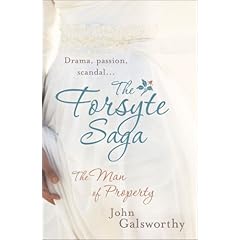
FORSYTES: I am otherwise booked this week reading The Forsyte Saga. I wasn’t planning to start my Galsworthy marathon till fall, but I have already read two-thirds of The Man of Property (the first book in the series) and CAN’T STOP. It’s one of those things. The next eight books will go fast. Anyway, we have had autumnal golden light, and the golden wild flowers are shaggily peering over the dryish, bending prairie grass, and last-minute summer birds and crickets are chirping end- of-summer songs, so it feels like fall.
There’s no denying that The Forsyte Saga (surely a Persephone kind of series) is an underrated classic, a celebration of rebellion against conventional mores. Though people mock Galsworthy, they often change their minds once they have read him. One of my favorite INTELLECTUAL blogs - now deleted - what a waste! - had a post about reading Galsworthy, how much he was enjoying it, and would now probably would find himself reading Arnold Bennett. (And of course that’ would be a good thing, as far as I’m concerned.) But clearly he had to overcome the middlebrow, second-rate label and was astonished by the quality of this traditional novel.

The first trilogy of The Forsyte Saga in one volume.
When I first discovered The Forsyte Saga, I’d attend classes, then go to work as a low-level clerk, then home to recovery-read and do my reading for classes. It was always hard for me to put aside the Forsytes to read Joyce, etc. Fascinated by the two romantic triangles described in The Man of Property, I was so sorry for artistic, musical Irene, caged in an unhappy marriage to materialistic Soames Forsyte, because her stepmother had wanted her off her hands. Soames, who adores her and can’t understand why she doesn’t love him, watches her fall for Bosinney, an architect who is building their country house. Soames can’t quite admit what is happening, though it’s causing a scandal among the Forsytes. Later, his cousin, Jolyon, an artist and outcast from the Forsytes, comes to Irene's rescue after a disaster.
One of my first university professors indicated that Galsworthy was second-rate, which amazed me, since the prof and I were kindred souls and he loved all my other canonical favorites AND watched the series on TV. So I couldn’t understand what was so middle-brow about Galsworthy. I guess it’s the fact that he wasn’t a “modernist: Joyce and Woolf set the bar, though they were a little later surely.
Jolyon , the artist who himself ran away from his conventional marriage (as did Galsworthy), defines a Forsyte in this dialogue:
“A Forsyte,” replied young Jolyon, “is not an uncommon animal. There are hundreds among the members of this Club. Hundreds out there in the streets; you meet them wherever you go!”
“And how do you tell them, may I ask?” said Bosinney.
“By their sense of property. A Forsyte takes a practical - one might say a commonplace - view of things, and a practical view of things is based fundamentally on a sense of property. ...He knows a good thing, and his grip on property - it doesn’t matter whether it be wives, houses, money, or reputation - is his hall-mark.”
2 comments:
I can't wait until the first three of the Forsyte books come in the mail. Why is it that looking at a brick of a book makes me put off reading it, but the thought of eight individual volumes makes the story much more approachable. I don't know much about Galsworthy--had no idea he was thought of as middlebrow--I suppose where you fall in history/the scheme of things has something to do with how you are accepted? In the interim I'm reading a collection of short stories by Mollie Panter-Downes set during WWII, which are excellent--very much about the homefront and another novel set at about the same time called House-Bound by Winifred Peck--which is a sort of clash of classes and what happens when a woman of the privileged class must learn to care for her home on her own. Interesting stuff.
Danielle, I am jealous that you have Mollie Panter-Downes' stories. I read her novel, One Fine Day, some time ago and loved it.
I should do this Persephone thing. I have a copy of Making Conversation and the print is huge, so I might be able to finish. I may try to read it this week, or maybe next week at least.
But I am crazily hooked on the Forsytes. It's so well-written and entertaining. I really think he deserved the Nobel. And I agree with you about the convenience of the individual editions. I have a big 900-page edition of the first trilogy, and it has biggish print, so it's not too intimidating, but paperbacks are my preferred reading, and it is nice to have individual editions.
Oh - and I ordered the BBC 1967 Forsyte Saga. Yes, this is called really getting carried away. It's 26 episodes, as opposed to the few on the last series.
Post a Comment